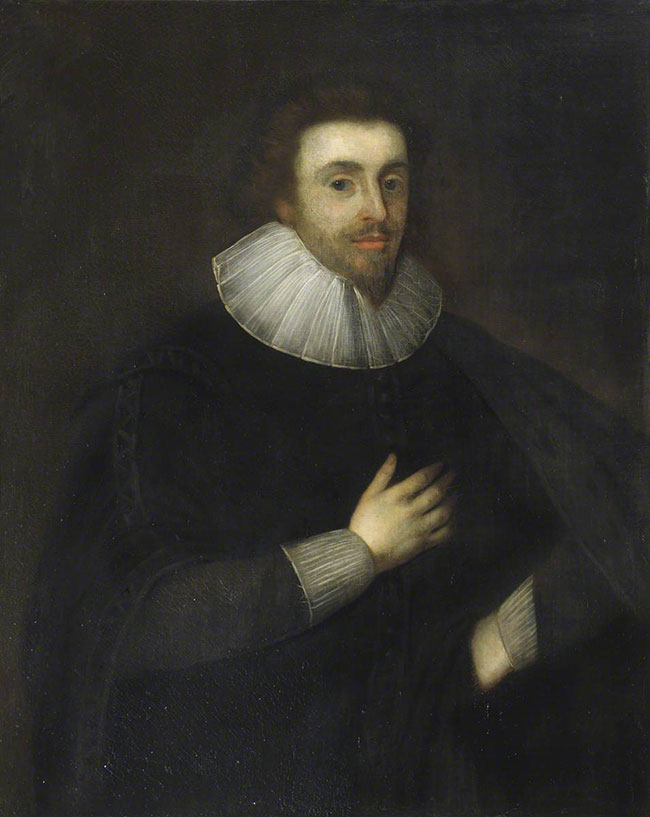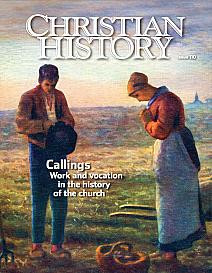FERRAR STAYED CALM IN CRISIS BECAUSE HE SAW ETERNITY

[Above: Nicholas Ferrar (1593–1637), Founder of a Devotional Community at Little Gidding, Huntingdonshire (after Cornelis Janssens van Ceulen)—William M. Hay (born c.1831); Clare College, University of Cambridge / [CC-BY-NC] Art UK]
NICHOLAS FERRAR stood quietly on deck. Turkish pirates were fast closing on the ship carrying him from Marseille to Spain. The terrified crew was ready to surrender. However, the boat’s master consulted Ferrar.
“Let us fall into the hands of God,” replied Ferrar, “and not into the hands of men.” He painted a bleak picture of the mistreatment that would follow capture. And he reminded the English sailors that their race had recently lorded over the seas. The sailors took heart and loaded their guns. To their surprise, the Turks veered away. (A more valuable prize had appeared on the horizon.)
The incident demonstrated several of Ferrar’s fine qualities: faith, leadership, and calmness in a crisis. This was not his first narrow escape. He had faced many dangers in the five years he had traveled Europe’s sunny south because of his poor health. Once it seemed a large beam of wood would knock him over a cliff. With no way to escape, he cried out in prayer. The donkey carrying the beam stumbled and Ferrar lived to tell the tale.
Ferrar’s European tour ended with a danger-filled trek across Spain in 1618. He then sailed for England where his presence was desperately needed. He had to salvage the Virginia Company in which his family was deeply invested. As the Ferrars saw it, the settlement of Virginia was not merely a financial venture but a mission endeavor. They were part of a loose network known as the Hartlib Circle whose theology called on Christians to restore the earth through evangelization, education, and building Christ’s kingdom on earth.
With herculean efforts and exemplary honesty, Ferrar set the Virginia Company’s finances in order. However, he could not overcome the Spanish faction at court. Spain did not want rivals in the Americas and its well-paid agents lobbied King Charles I to squash the Virginia enterprise. The king revoked its charter. In parliament, however, Ferrar restored the honor of the company and took a leading role in impeaching its enemy, Lord Treasurer Cranfield.
Offered the hand of a wealthy and attractive woman, Ferrar declined. He intended to remain celibate, he said. He was resolved to spend his best years in devotion and charity away from the centers of empty earthly power. With the enthusiastic support of his widowed mother, he bought and repaired a ruined house and chapel at Little Gidding, moving there in 1626.
With about thirty family members, servants, and schoolmasters, Ferrar established an austere regimen. Volunteers took turns around the clock praying and reciting psalms. Although marriage was accepted, some of the women chose not to wed. Enemies seized on this fact to accuse Ferrar of trying to restore Roman Catholic monasticism. However, Little Gidding was solidly in line with the high church practices of the Church of England.
Little Gidding was not just about devotion. Everyone did useful work such as study, bookbinding, needlework, and nursing. The experiment in Christian living provided employment, schooling, and medical care for its neighbors, as well as meals for the poor. Among its output were harmonies of the Gospels. Nicholas Ferrar also arranged publication of George Herbert’s poems The Temple, whose value he recognized. Literature had always been important to him. (One of his last actions was to have his family burn secular literature he had prized too highly.)
Never robust, Ferrar’s health failed about ten years after he moved to Little Gidding. On this day, 1 December 1637, he made a solemn confession of faith to Luke Groose, vicar of Great Gidding, and received absolution and Holy Communion for the last time. Three days later he exclaimed,
Oh, what a blessed change is here! What do I see? O let us come and sing unto the Lord, sing praises to the Lord and magnify His Holy Name together. I have been at a great feast, the Great King’s feast.
About one that morning, the time when he used to rise for prayer, he gave one last gasp and was gone.
The family kept Little Gidding going until Ferrar’s siblings died in 1657. “Little Gidding,” said Sarah Irving-Stonebraker, “was a sanctuary from the corruptions of worldliness, but certainly not a retreat from the project of transforming the world in the image of Christ.” That is why the idea of Little Gidding continues to serve as an inspiration to Christians who wish to live lives of devotion in partial seclusion from the world.
—Dan Graves
----- ----- -----
Ferrar experienced miraculous escapes. For other miraculous happenings, watch About Miracles at RedeemTV.
(About Miracles can be purchased at Vision Video.)
For poems of George Herbert relating to work, see "Making drudgery divine?" in Christian History #110: Work and Vocation








